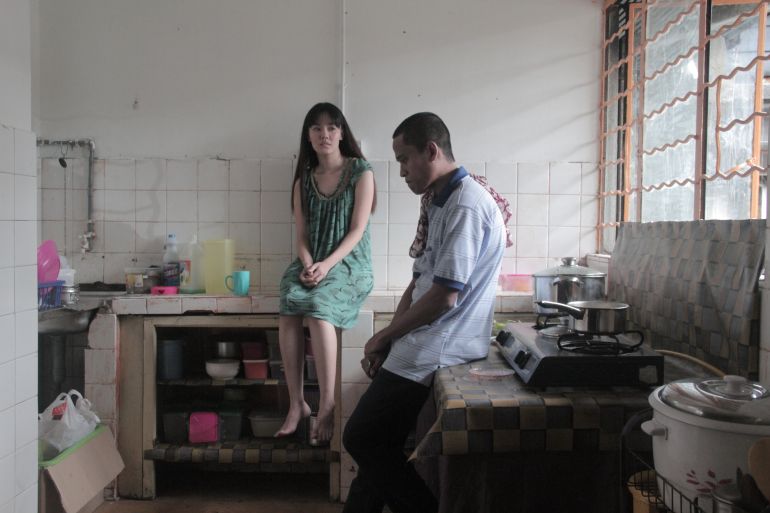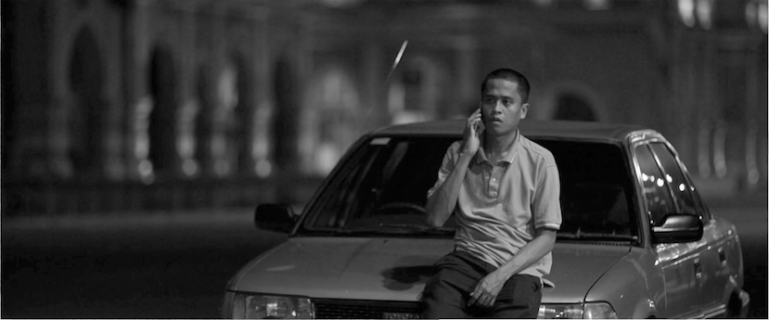Malaysia’s Oscar hope is a gritty, urban coming-of-age tale
Prebet Sapu brings multiracial realism back to cinema screens, signalling some relaxation in local censorship attitudes.

Kuala Lumpur, Malaysia – Armed with a trunk stuffed with possessions and a head full of dreams, Aman drives the battered car he has inherited from his late father from his home town in Malaysia’s forested interior to the capital Kuala Lumpur.
Being colour blind, the young ethnic Malay man does not hold a proper driving licence but his car is his only possession, so he ekes out a living on the margins working illegally as a driver in his alien new surroundings. Chaperoned by Bella – an ethnic Chinese escort he meets driving at night – Aman will soon learn that in the big city, dreams are as fragile as glass, and innocence and sin are two faces of the same coin.
Keep reading
list of 4 itemsDocumentary on femicides in Turkey is UK’s Oscars nomination
Demon Slayer becomes Japan’s top-grossing movie
‘Speechless’: South Korea hails top Oscars prize for Parasite
Shot in contrasting, saturated black and white to reflect the bi-tonal palette of Aman’s vision, Muzzamer Rahman’s debut film Prebet Sapu (2020), known internationally as Hail Driver, seems an unlikely candidate to represent the predominantly Islamic and strait-laced Southeast Asian nation at next year’s Academy Awards.
“While writing Prebet Sapu’s script I was aware that it may have been censored because of its content touching on the electoral and political atmosphere [in Kuala Lumpur],” Muzzamer told Al Jazeera, reflecting on the changes that have taken place since Mahathir Mohamad first stepped down after 22 years as prime minister in 2003.
“I grew up in the Mahathir era, so I used to teach myself to be ready. However, this is vital story background in my film, and is related to human relations in Kuala Lumpur.”
Regardless of Muzzamer’s concerns, after turning heads at Italy’s Far East Film Festival, the Toronto Reel Asian International Film Festival, and Spain’s Asian Film Festival, Prebet Sapu was chosen in early November by the National Film Development Corporation Malaysia (FINAS) as the country’s next submission to the Oscars’ Best International Film category.
“We had two strong contending submissions this year, the other being Barbarian Invasion (2021) by Tan Chui Mui, and we had to use a strict voting system to select a winner,” said Ku Mohamad Haris Ku Sulong, a board director at FINAS.
“The panel ultimately decided on Prebet Sapu because it’s a bit closer to true life and best reflects what we, as Malaysians, really are.”
‘Be a bit more daring’
The decision reflects FINAS’ recent commitment to support young filmmakers regardless of genre and submit films to the Academy Awards every year. Last year’s Oscar submission was an atmospheric jungle horror, Roh (2020), the debut film by Malay director Emir Ezwan.
Prebet Sapu is only the seventh film Malaysia has submitted for the Oscars since 2004.

Rather than follow the local box-office logic of producing monolingual films that only appeal to one of the multiethnic country’s three distinct audience segments – the Malays, Chinese, and Tamil Indians – Haris told Al Jazeera that regardless of language and genre, FINAS wants to support more critical films that truly represent Malaysia’s complex reality and can advance the country’s position in the rising Southeast Asian film industry.
“I’m trying to push the documentary and short film categories for next year’s Oscar submission, and I am encouraging young directors to push the boundaries, to be a bit more daring,” said Haris.
For now, Prebet Sapu, which opens in Malaysian cinemas on Thursday, December 16, certainly fits the bill.
The film features a multiethnic cast with Amerul Affendi (Aman), Lim Mei Fen (Bella), and cameos by popular Malaysian actors Bront Palarae and Sharifah Amani – best known for her role as Orked in the landmark films Sepet (2005) and Gubra (2006) by Yasmin Ahmad, which focused on the troubled inter-ethnic love story between a Malay girl and a Chinese Malaysian teenager. The film depicts Kuala Lumpur’s modernity, fraught ethnic relations, and endless thirst for development without pulling punches.
Using multi-language dialogue in Malay, English and Mandarin Chinese to best capture the authenticity of Malaysia’s ethnic jigsaw, Prebet Sapu stands proud in the shadow of the iconoclast Malaysian New Wave cinema of the 2000s, when filmmakers like Yasmin Ahmad, Amir Muhammad, Tan Chui Mui, Woo Ming Jin, James Lee, and Ho Yuhang filmed Malaysia’s social and inter-ethnic struggles as they saw them.
“If one thinks we were mostly about socio-political criticism, or social realism, or cinema verité, I must admit that it was mainly because we had no budget for art direction, so we used real locations, and asked the cast to bring their own wardrobe,” Tan told Al Jazeera, playing down the role that these films had in propelling the nation’s independent filmmakers to the attention of festival screens around the world, including Venice and Cannes.
But they also remained shunned and banned at home, sidelined by the strict censorship that still polices the performing arts and popular culture in a country where about 61 percent of the population is Muslim.
Beating around the bush
Regardless of the steps forward, the Malaysian movie industry remains a difficult space to navigate.
Since 1936, the Film Censorship Board of Malaysia, a separate entity from FINAS, has banned more than 50 local and international films for being too violent or containing scenes that could offend the sensitivities of Muslims.

Guidelines for film censorship loosened in 2010, allowing for movies with violence and profanity to be screened in cinemas, sometimes without cuts. But filmmakers still need to approach sensitive subjects with extreme care.
“Race and religion are always two elephants in the room we pretend not to see or question critically,” said director Lau Kek Huat, who, together with other Chinese Malaysian filmmakers like Namewee and Chong Ket Aun, says he had to move to Taiwan to be able to speak openly about his native Malaysia.
“There used to be a code called VHSC – violence, horror, sex, counter-culture – that characterised our film censorship,” said Amir Muhammad, a pulp-fiction publisher and the director of controversial and banned documentary films like The Big Durian (2003), The Last Communist (2006), and Malaysian Gods (2009).
Since 2018, Amir has been the managing director of Kuala Lumpur-based horror and genre-focused Kuman Pictures, which produced Malaysia’s previous Oscar submission Roh, which is now streaming on Netflix.
“[Censorship] has evolved over the years but it’s usually at the whim of the government and its priorities,” Amir said. “The consistent strand is that films that challenge Malay-Muslim hegemony or the dominant political order will run into trouble.”
Amir also adds that with the rise of digital streaming platforms like Netflix and Disney Hotstar, Malaysian filmmakers now have unfiltered spaces to circulate their work.
The streaming platforms are not subject to the same level of scrutiny as cinemas and are protected to some extent by a “no censorship” pledge the government made when it established the Multimedia Super Corridor in 1995 to bring Malaysia into the digital age.
“The [censorship] tolerance level has also improved tremendously,” Haris of FINAS told Al Jazeera. “We are now working towards establishing proper categories from PG13 to PG18 to help pass films that wouldn’t have (passed) before”.
Returning waves
Even if it did not make the Oscar selection, Tan Chui Mui’s Barbarian Invasion (2020) won the coveted Golden Goblet Awards at the Shanghai International Film Festival earlier in June, adding weight to the return of more authentic and daring Malaysian filmmaking.
Both a personal homage to motherhood and a love letter to the resilience of independent cinema, Tan’s third film brings together many of the former protagonists of the Malaysian New Wave, including the director herself, actor Pete Teo and director James Lee.

It was also produced by director Woo Ming Jin, whose The Tiger Factory (2010) was screened at the Cannes Film Festival.
After experimenting with more mainstream Malay-language productions such as KL Zombi (2013) – which was rated PG and released after 30 cuts and the muting of several lines of dialogue – Woo is going back to his roots with the upcoming Turtle Stone (2021), a revenge thriller about stateless people who earn a living by poaching turtle eggs.
“For me, it’s just about returning to the joy of making films without the commercial pressure and restrictions that are often found in more mainstream cinema, which has to contend with censorship, genre restrictions, and snaring the largest possible audience,” Woo told Al Jazeera.
Compared with neighbouring nations like Indonesia, the Philippines and Taiwan, whose films Woo consider more varied in terms of narratives and themes, Malaysia still lacks the freedom to discuss more touchy subjects like politics and religion.
“To be the ‘jaguh kampung’ (village hero), this isn’t an issue, but to become world-class, that’s another story,” he said.
FINAS’s Haris, who directed and produced commercials, telemovies and series prior to becoming a FINAS member, acknowledges that bolder filmmaking gets attention.
But he does not appear to think Malaysia is yet ready to loosen control.

Instead, he asks filmmakers to shoot two variants of their films to ensure they can get approval to screen in Malaysian cinemas.
“Use the bolder version for the international market,” Haris said. “We [still] need subject matters that are a bit on the edge because those are the films that get more international attention.”
For the moment, Muzzamer is thankful that Prebet Sapu got a complete screening approval without any cuts, “and yet received the classification of a film that can still be watched by my target audience,” he told Al Jazeera.
“Censorship should not repress the voice of the filmmaker and determine what is right and wrong from the perspective of a film director.”